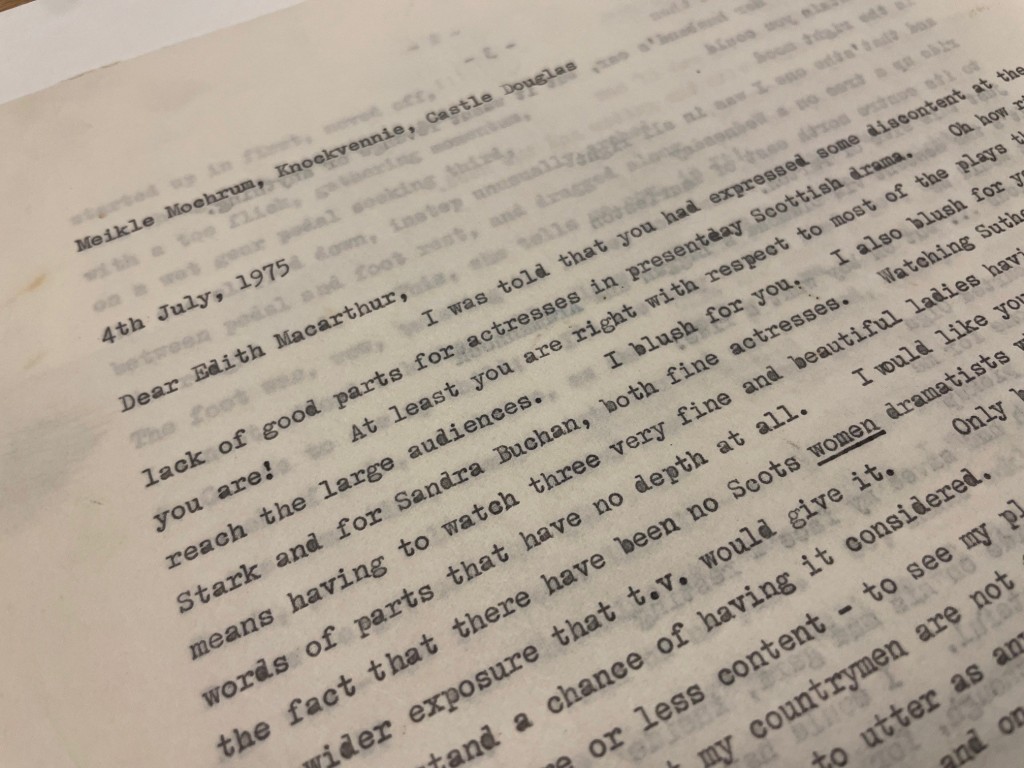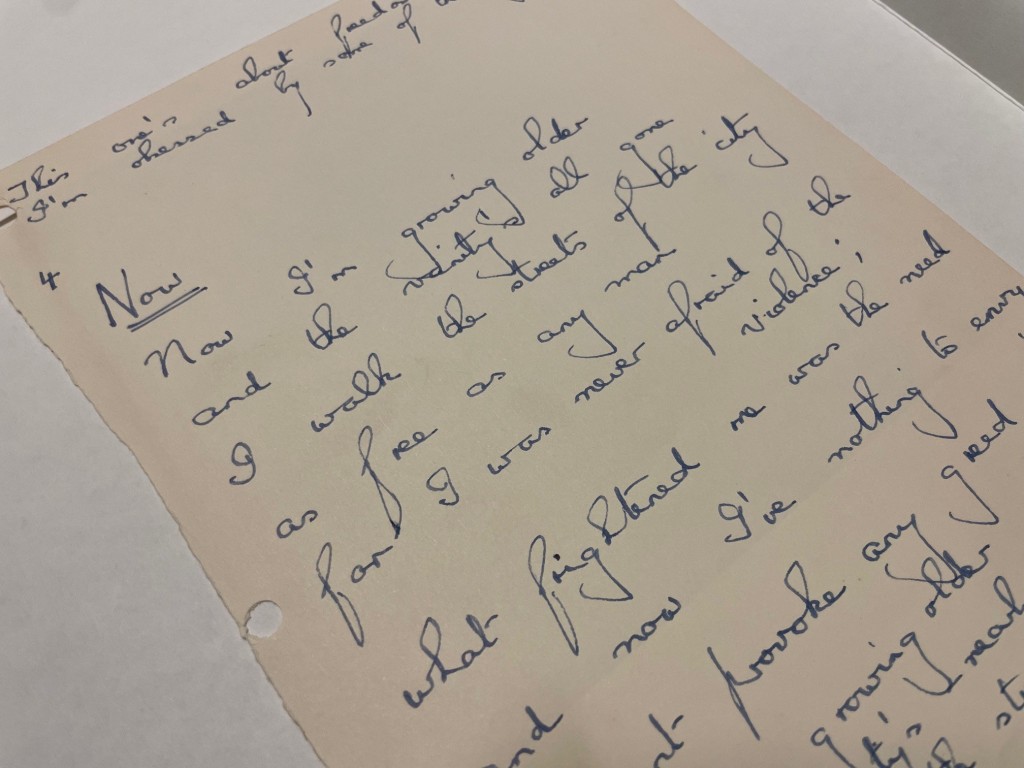A guest blog post by Mirren Loughery, from the Memorialising Scottish Literature & Culture placement, working on the Papers of Joan Ure (ASC 011 A: Writings) in Archives and Special Collections
Delving behind the limited publications of Joan Ure into the enthralling collection of her personal writings held within the Glasgow University Archives and Special Collections (ASC) offers insight into the magnitude of work produced outwith her known plays. The joy of exploring these papers lies in their variety, ranging from typescript copies of plays and poems, interspersed with annotations, communications, and reflections, to handwritten notes quoting other admired artists such as one page beginning “a poem by a modern Swedish poet Nils Ferlin (I love it)” (ASC 011 A/90). Eloquently flowing between humour, insight, and angst, the breadth of Ure’s themes and formats transcends boundaries on how writing is expected to behave, with a quietly assertive birr. So, who was Joan Ure and why aren’t we talking about her more?
Elizabeth Thomson Clark was born on 22 June 1918 in Wallsend to Scottish parents, later adopting the pseudonym Joan Ure for her writing, as can often be seen written next to scribbled out print of her married name on the front of her typescript pages (ASC 011 A/84/1). Growing up around the outskirts of Glasgow and being forced to assume a heavy household role with the death of her mother during her early life, the experience of juggling domestic responsibilities alongside the ability of a talented writer is generally considered to influence concerns with national gender identity and human relationships in her work. However, without probing too deeply into her writing for real life inspiration, explicit connection between her personal life is apparent, perhaps most visibly in the author’s note to the play Me Jane, You Elfie! which iconically states: “I have sent this play out to no management till now because it was a bit too autobiographical and I had to wait till folk either died off or had forgotten. 1976 February J.U” (ASC 011 A/80). Such dead-pan wit characterises many of her plays, where profound questions are crafted into seemingly absurd situations, with further notes on her archived work extending this application onto the relationships between cast and play in addition to the writer and the written.
Relatively unacknowledged in her own lifetime, gradual engagement has revealed the necessity of heightening awareness of Ure’s work to bring it to its rightful place in the Scottish literary tradition. Yet here hindsight bears its benefit alongside its presentist curse, raising questions on how to adequately represent Ure’s writing when attempting to reassert it within a different historical context. Writing in a male-dominated playwright scene of the 1950s undoubtedly influenced the production and reception of her work; but caution is required around assigning her the role of ‘feminist writer’ which risks continuation of perpetrating gendered markers of identity onto her art. One striking page relating to the experience of women in the arts within the ASC features on the back of a typescript copy of the short story Lauriston July (1975), which appears to be a draft of a letter by Ure to a Scottish actress (ASC 011 A/75). Asserting the validity of the actresses claim that there were not enough roles with any kind of intellectual depth for woman in Scottish theatre, Ure states how she tries to help fill this gulf with the writing of her own plays. Unfortunately, the text breaks off soon after, with the document leaving it unclear whether a letter was eventually sent or what communications occurred henceforth, but markedly hints at a shared keenness to broaden the scope of Scottish theatre for women.
An awareness between how the past and future interlink, and how they represent people, is visible in her creative work itself, balancing reflection alongside hope. As scholar Richie McCaffery highlights: “even Ure’s most polemic work is about protest and reconciliation… it circulates new strategies and ways forward that are deeply informed by past experiences” (2016). In a typescript copy of the play I Am a Queen? How About You?, the word history is notably underlined before the script goes on to wittily highlight the fallibility in remembering people from the past. The Jester states to the Queen: “It’s no greater solution being you than it is being me. History will damn you certainly. Although there will be differences of opinion. They will only forget me” (ASC 011 A/61). This passage encapsulates the inescapable power dynamics of history which seep into remembrance, whilst recognising the opportunity of the future to condemn or rewrite actions of the past. Such points speak to contemporary concerns in memorialisation and remain applicable to any disempowered people, although here being forgotten is hinted to be the more forgiving fate.
When looking to the future, bitterness co-exists with optimism, as seen in a manuscript copy of the poem “Now” which begins in flowing blue ink with a note by Ure, stating “This one’s about freedom too”. Placing the idea of change within the ageing process, the poems starts: “Now I’m growing older/ and the vanity’s all gone/ I walk the streets of the city/ as free as any man” (ASC 011 A/92). Encased on such a little sheet of paper, these grand ideas cross time and place liberation within reach of the present. They involve inward reflection, to change personal perceptions, and call for a readiness from the world to accept and support its inhabitants in return. Although, adequate answers to representation remain a challenging feat, Ure’s own approach of contemplation and thinking forward seems a fitting format to approach the world and her own works.
The University of Glasgow’s holdings in Archives & Special Collections are much enrichened by the inclusion of Joan Ure’s papers, and hopefully access to the public will raise the attention given to her work. The annotated prints of her plays speak not only to her own experiences, but also to the network and connections of artists in Scotland (inside jokes alluding to frustrations and fallouts in the production of plays familiar to anyone with any experience in theatre). Her co-founding of the Scottish Society of Playwrights proves one example of how she collaborated with other writers to heighten the prominence of Scottish plays and help pave the way for future creatives. In her afterlife, the responsibility has again fallen to fellow writers and scholars to remember her, one fitting tribute being Ian Brown’s poem At Antalya/ Remembering Joan, ending with the description: “And I remembered your pseudonymic confusion and grace/ No lecturer, no mere lady/ Alive and no real pretence// No simple virtue ever”. Engagement with her archived work offers a unique opportunity to discover the person and work that evoke such magnetic qualities, with the depth and scope offering different experiences of readership for every individual. Whilst published work is still to catch up, the material within ASC provides a rich stylistic body to uncover; may it offer a continuation of influence and encouragement to Scottish writing.
McCaffery, Richie, “The Dangers of Fighting to be Heard in Poetry” (2016) in Dangerous Women, available: <https://dangerouswomenproject.org/2016/06/24/joan-ure/> [accessed 1 March 2024].
McCaffery, Richie, “Joan Ure” (2018) in Scottish Poetry Library, available: <https://www.scottishpoetrylibrary.org.uk/poet/joan-ure/> [accessed 1 March 2024].
McKendrick, Claire, “The Tiny Talent: Selected Poems by Joan Ure” (2018) in University of Glasgow Library Blog, available: <https://universityofglasgowlibrary.wordpress.com/2018/12/04/the-tiny-talent-selected-poems-by-joan-ure/> [accessed 3 March 2024].
Peebles, Alistair, “Ian Brown – Remembering Joan Ure” (2019) in Brae Editions, available: <https://braeeditions.com/2019/01/21/remembering-joan-ure/> [accessed 1 March 2024].
Small, Christopher, “Joan Ure Plays: Introduction” in Joan Ure: Five Short Plays (Glasgow, Scottish Society of Playwrights, 1979).
Trotter, Robert, “Clark, Elizabeth Thomson” (2004) in Oxford Dictionary of National Biography, available: <https://www.oxforddnb.com/display/10.1093/ref:odnb/9780198614128.001.0001/odnb-9780198614128-e-60220> [accessed 1 March 2024].
Categories: Archives and Special Collections, Library, Reflections



 Joan Ure: MSLC 2024 – ‘Why Have I Never Heard of Joan Ure?’
Joan Ure: MSLC 2024 – ‘Why Have I Never Heard of Joan Ure?’  Eddie and the Library Angel: Ukrainian Poetry in the Edwin Morgan Archive
Eddie and the Library Angel: Ukrainian Poetry in the Edwin Morgan Archive  Diving into Adam White’s Album Amicorum
Diving into Adam White’s Album Amicorum
Leave a comment